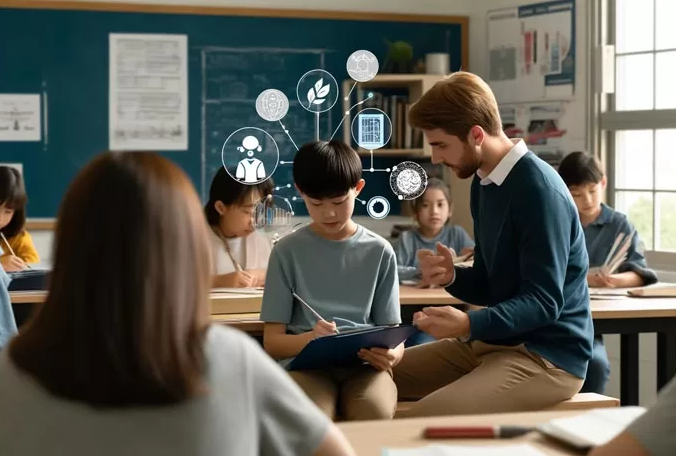One of the most valuable outcomes of education is the development of independent learning skills. The ability to learn independently not only empowers students to take charge of their education but also prepares them for lifelong learning. As the world increasingly relies on digital technology, students have unprecedented access to resources and tools that foster self-directed learning.
Technology has transformed the learning process, enabling students to explore subjects at their own pace and in their own unique ways. With tools like AI-powered platforms, step-by-step solvers, and educational apps, learners can overcome challenges and build confidence in their abilities.
Building Confidence in Math
Mathematics has always been a subject where many students struggle, often feeling overwhelmed by its abstract nature. However, the emergence of tools like the Math Solver has made math more accessible and manageable for learners at all levels.
These tools are designed to break down even the most complex math problems into smaller, easy-to-understand steps. For instance, if a student encounters difficulty solving a calculus problem, the Math Solver doesn’t just provide the final answer. Instead, it walks the student through each step of the solution, explaining the logic and process behind it.
This systematic approach has several benefits:
- Promotes Understanding: By focusing on the process, students gain a deeper understanding of mathematical concepts rather than just memorizing formulas.
- Builds Confidence: Each successful step reinforces the student’s belief in their ability to solve problems independently.
- Encourages Practice: With clear guidance, students are more likely to practice regularly, which further strengthens their skills.
By making math less intimidating, tools like the Math Solver empower students to tackle problems head-on, fostering confidence and a positive attitude toward learning.
How AI Boosts Self-Learning
Artificial intelligence has revolutionized education by making self-learning more accessible and effective. Platforms like UpStudy Homework Helper AI play a crucial role in this transformation. These tools provide tailored guidance, ensuring students receive the support they need to succeed without relying solely on teachers or tutors.
AI tools excel in adapting to individual learning styles. For example, if a student struggles with science concepts, UpStudy identifies their weak areas and provides personalized explanations, examples, and practice exercises. This targeted approach helps students overcome their challenges while boosting their problem-solving and critical-thinking skills.
Another advantage of AI tools is their availability. Unlike traditional tutoring, which is limited to specific hours, platforms like UpStudy are available 24/7. This means students can access help whenever they need it, whether it’s late at night or during the weekend. This flexibility encourages learners to take responsibility for their education, seeking out answers and solutions independently.
Integrating APIs into Educational Apps
Educational APIs, such as the Step-by-Step Math Solver API, are powerful tools that developers and educators can use to enhance learning platforms. These APIs provide intelligent features that offer real-time assistance to students, encouraging them to practice and solve problems independently.
For instance, when integrated into a learning app, the Math Solver API enables students to receive instant feedback and detailed solutions for their math problems. This not only helps them understand their mistakes but also guides them toward the correct approach.
The benefits of incorporating APIs into educational apps include:
- Interactive Learning: Students can engage with problems dynamically, receiving step-by-step solutions and explanations.
- Personalization: APIs can adapt to individual learning styles, providing customized solutions that cater to each student’s needs.
- Scalability: Educational institutions can use these APIs to support large numbers of students, ensuring that everyone has access to quality resources.
By integrating such innovative technologies, educators and developers can create platforms that inspire students to explore, learn, and grow independently.
Encouraging Exploration Beyond the Curriculum
Independent learning is not just about mastering school subjects; it’s also about exploring new areas of interest beyond the standard curriculum. Technology enables students to dive into diverse topics, from coding and graphic design to robotics and creative writing.
Tools like UpStudy Homework Helper AI are excellent starting points for students who want to go beyond their textbooks. These platforms encourage curiosity by offering resources and explanations on a wide range of topics. Additionally, APIs like the Step by Step Math Solver API can be adapted for other fields, such as physics or engineering, helping students explore advanced concepts.
For example, a student interested in astronomy can use online learning platforms to understand mathematical models used in space exploration. Such opportunities spark creativity, critical thinking, and a love for learning that extends far beyond the classroom.
Developing Lifelong Learning Habits
One of the greatest advantages of fostering independent learning is the development of lifelong learning habits. As students learn to rely on themselves and use technology effectively, they build essential skills like self-motivation, time management, and adaptability.
These habits are invaluable in today’s fast-changing world, where continuous learning is necessary to stay relevant. Whether it’s mastering a new language, picking up coding skills, or preparing for professional certifications, the ability to learn independently sets individuals apart.
Technology, like the tools and APIs mentioned, ensures that students are not just prepared for exams but are equipped to learn and grow throughout their lives. By empowering them to take charge of their education, we are preparing them for a future where adaptability and self-learning are key to success.
Conclusion
Independent learning is the foundation of personal and professional growth, and today’s technology makes it more achievable than ever before. Tools like Math Solver, UpStudy Homework Helper AI, and APIs like the Step-by-Step Math Solver API enable students to explore subjects, solve problems, and build confidence on their own.
By providing personalized guidance, encouraging exploration, and developing lifelong learning habits, these tools help students prepare for the challenges of education and beyond. The journey of learning becomes not just about acquiring knowledge but about developing the skills and mindset to thrive in an ever-evolving world.

